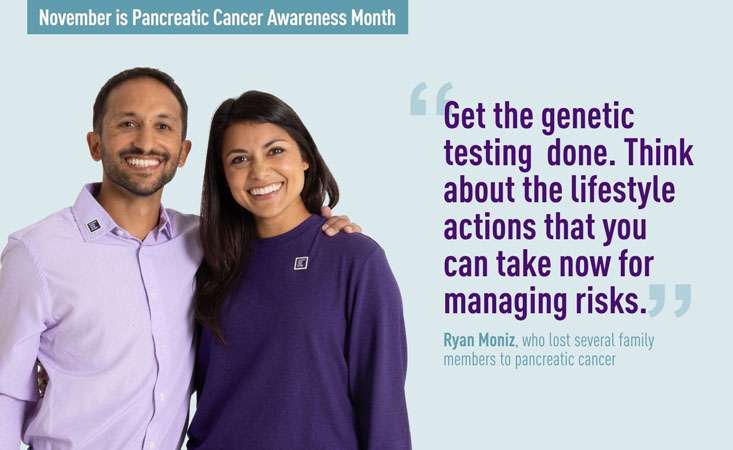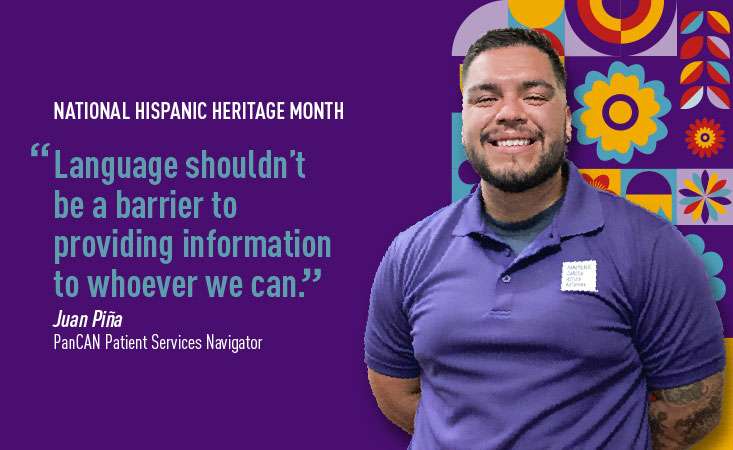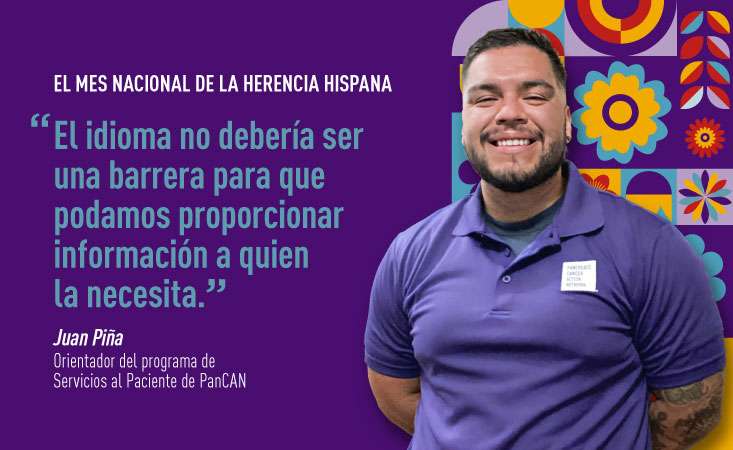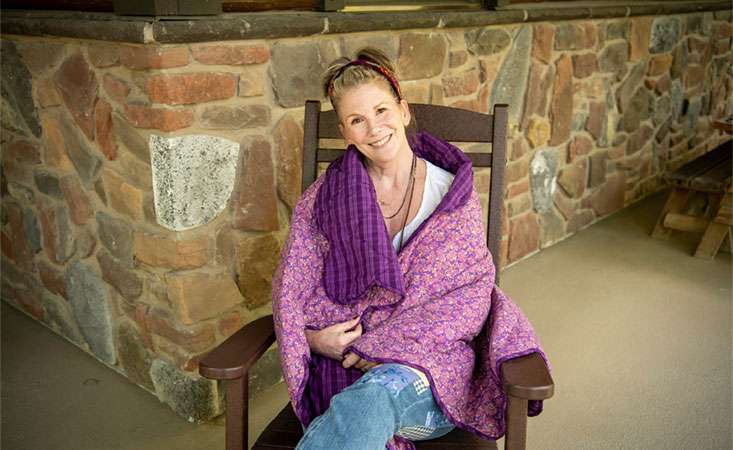
For people with pancreatic cancer and their loved-ones, PanCAN Patient Services serves as a vital resource during what can be a complicated and difficult time. Our team of expert Case Managers walk with patients through challenges and decision points, providing information and support. Building on our long history working with families impacted by pancreatic cancer, we recently added another small but mighty team, helping to address barriers we have seen in the healthcare system that make a life-changing diagnosis even more challenging to navigate. They are on deck, ready to assist patients who need extra support. Learn more about our two new PanCAN Patient Services Navigators, Juan Piña and Brianne Flores, and the work that they do.
What is a PanCAN Patient Services Navigator?
 Brianne: Working together with our incredible team of Case Managers, Patient Services Navigators serve as a guide for patients and caregivers throughout their journey to help them navigate the complexities of the healthcare system. When constituents reach out to the Patient Services Help Line, Case Managers are the first point of contact. They help the constituent understand their needs and what information they would benefit from. As Patient Services Navigators, we provide an extra level of support and attention to ensure those needs are met, even when faced with barriers that seem hard to overcome.
Brianne: Working together with our incredible team of Case Managers, Patient Services Navigators serve as a guide for patients and caregivers throughout their journey to help them navigate the complexities of the healthcare system. When constituents reach out to the Patient Services Help Line, Case Managers are the first point of contact. They help the constituent understand their needs and what information they would benefit from. As Patient Services Navigators, we provide an extra level of support and attention to ensure those needs are met, even when faced with barriers that seem hard to overcome.
Juan: As we all know, when facing pancreatic cancer, there’s a healthcare team that’s coming to the patient’s aid. Even though the healthcare team provides education and support, they can have a limited amount of time with each patient during appointments. The Patient Services Navigator is there to provide additional information and understanding before and after patients talk with their healthcare team. This is especially important given that everyone has different levels of literacy, whether it’s tech literacy or maybe it’s a language barrier. Our job as navigators is to provide assistance and outreach – a level of support that not all patients have. I speak Spanish, so together we can help constituents in diverse communities.
What are some of the conversations you are having with constituents as a Patient Services Navigator?
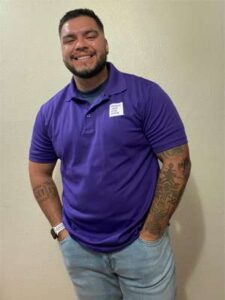 Juan: There is a need to provide information to people who don’t know the healthcare system – maybe this is their first major diagnosis and they need that support. We empower them to have conversations with their doctor about options beyond the standard of care, like precision medicine or clinical trials. Sometimes patients don’t necessarily know what to ask at their appointments. We provide that education so that they can know that it’s okay to ask your doctor questions. It’s okay to explore treatment options and to discuss treatment options. Even if a patient is not pursuing them immediately, there can be a possibility to revisit the conversation later and they’ll have the information at the ready.
Juan: There is a need to provide information to people who don’t know the healthcare system – maybe this is their first major diagnosis and they need that support. We empower them to have conversations with their doctor about options beyond the standard of care, like precision medicine or clinical trials. Sometimes patients don’t necessarily know what to ask at their appointments. We provide that education so that they can know that it’s okay to ask your doctor questions. It’s okay to explore treatment options and to discuss treatment options. Even if a patient is not pursuing them immediately, there can be a possibility to revisit the conversation later and they’ll have the information at the ready.
Brianne: We give guidance for some of PanCAN’s programs, like Know Your Tumor®, which offers free tumor biomarker testing to help determine if there are treatments available tailored to that patient’s biology. When the report is completed for Know Your Tumor, our responsibility is to share or relay that information to the patient and let them know that their report has been delivered to their doctor. We will then, of course, encourage them to have those important conversations with the healthcare team about how they can utilize the report to help inform treatment decisions. We can also perform a clinical trial search and help them enroll in trials that are targeting the mutations listed on their report.
What have you learned so far in your role as a PanCAN Patient Services Navigator?
Juan: We definitely see how lapses in communication affect the patient’s journey. For example, it’s important for patients to have an overview of all their treatment options. I often talk with patients about clinical trials – something they may not hear from their doctor. And even if they do, they may have difficulty connecting with a trial site. As navigators, we can narrow down a list of clinical trials based on the patient’s preferences and do our best to connect patients with the sites. Often the patients have done this initial outreach themselves and they’ve had no success. So, it’s nice hearing back from the patients when we are able to connect them, while at the same time it reflects some of the gaps in the healthcare system.
Brianne: I’ve learned the importance of guiding patients through complex processes with effective communication. And of course, compassion is very important. I have also gained insight into some of the challenges that patients face navigating the healthcare system. Like Juan, most of my navigation referrals have been centered around clinical trials and patients being unable to connect with trial sites. Having someone there by your side who is able to help you with that outreach and establish that successful connection to the trial coordinator can be a huge weight lifted off of the patient. The work that we’re doing is essential, and as we continue to learn and grow in this role, we’ll be able to help patients more and understand further what the need is.
What motivates you in doing this work as a PanCAN Patient Services Navigator?
Juan: What drives me is to fill a need for Spanish-speaking constituents. Often they’re the ones who need the most support, especially if they don’t speak English and/or don’t have family who is able to translate the information. That’s where I feel my talents are most used and where I feel like I can thrive. Also, I think Brianne and I have a specific, really ambitious tenacity when we’re doing this outreach. We don’t mind being the pebble in someone’s shoe if we’re not getting a response back, and we can do that on behalf of the patient. At some point someone’s going to take the shoe off and try and move the rock out. So that’s when we’ll know, “Okay, we got a response. Awesome. Can we connect you with this person?”
Brianne: I decided to work with PanCAN because I have a strong passion and desire for helping others and I want to make a positive impact on their lives. In this role specifically, my hope is to make the healthcare journey smoother and less overwhelming for patients by providing support and relevant resources, and doing outreach on their behalf. Also, from my own personal experiences with cancer, I know the difference a navigator can make in the lives of patients and their families. I wanted to be able to provide what a navigator did for my family to others. Pay it forward.






